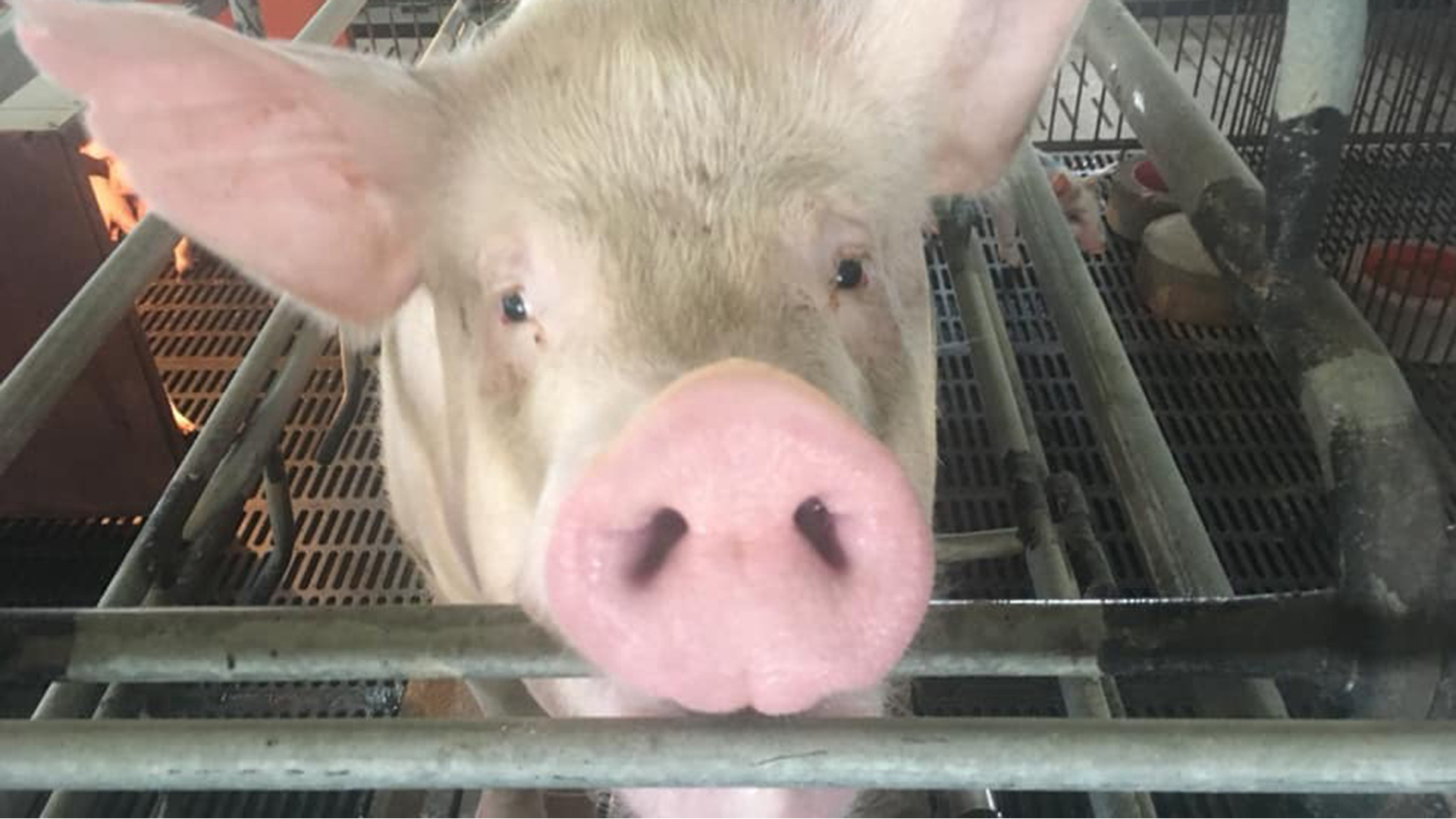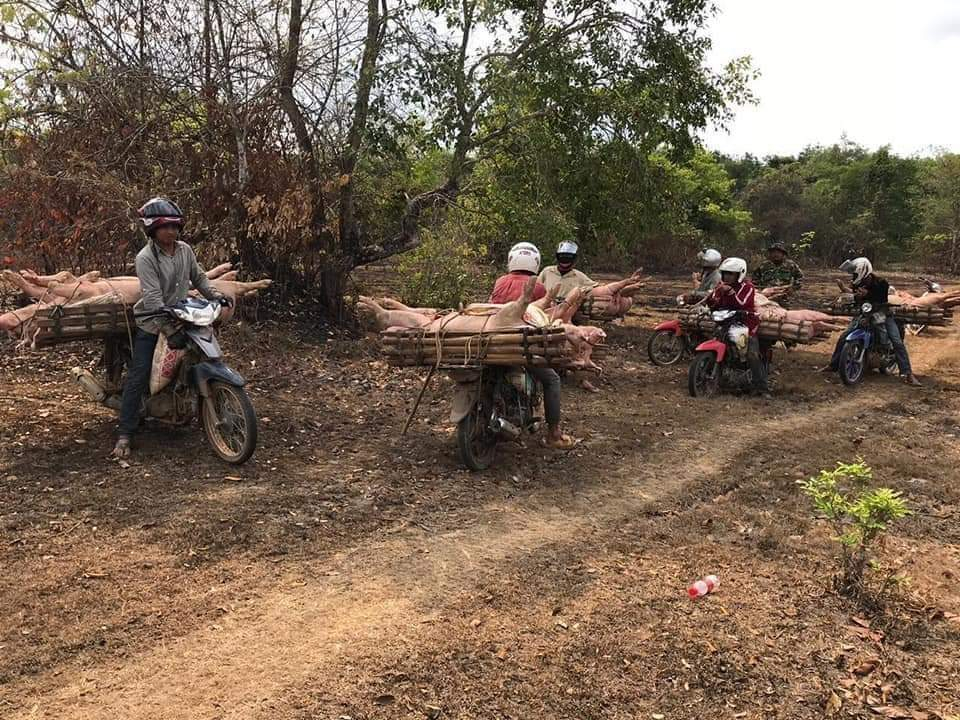

As one of the world's worst-ever animal disease outbreak rages across Asia, bio-security has never been higher.
Thailand is making every effort to keep the sickness out, so accessing a farm in Ratchaburi Province, west of Bangkok, was a major undertaking. Questions such as "Had any of us been to a country where the disease was present?" and "Had anyone recently been to another farm in Thailand?" were asked beforehand.
The answer to both questions was no, so we were allowed to proceed but not before we drove our car through a disinfectant bath. Every surface of the vehicle had to be sanitized. Then, it was our turn. We had to take a thorough shower.
First, we had to remove every piece of clothing and walk through a full-body disinfectant spray. Then we had to take a normal shower with soap and shampoo before finally dressing in specially prepared clothing and boots provided by the farm.

Smugglers attempt to illegally sneak pigs across the border from Vietnam to Cambodia, where prices are higher. /CGTN Photo
Despite these exhaustive measures, some experts say the disease is still not completely eradicated, and Thailand will soon fall victim as well.
Swine fever can't be passed to people, so there's no human health risk. But it’s a killer for pigs. It causes them to bleed internally until they die. There is no vaccine or cure, and the only way to halt or slow the spread is to slaughter infected animals.
There are already major outbreaks in China and Vietnam. Now, it's in Cambodia. Cases have also been discovered in Mongolia, Hong Kong, and the DPRK.
Millions of pigs have been slaughtered, and some predict it will be hundreds of millions before the pandemic is over.
There is now a shortage of pork products, and prices have jumped by almost 40% in some places.

Thailand is employing strict bio-security measures to try to keep the disease out. /CGTN Photo
The next country in line is Thailand, Asia's second-largest pork producer, with an industry worth 3.3 billion US dollars a year.
"We are trying our best to keep it out, or at least slow it down as much as we can," said Nipat Nuanim, vice president of the Swine Raisers' Association of Thailand. "If pigs become infected, 100 percent (they) will die."
Amid the outbreak, illegal smuggling is rife, which poses serious risks for disease control.
The animals sell for different prices in different countries, so sneaking across borders is common. In Cambodia, the authorities caught a gang of motorbike smugglers red-handed as they attempted to bring pigs into the country from Vietnam.
In another success, the authorities captured a second gang who were trying to use the cover of night to smuggle animals. However, many times the criminals get through. In Bangkok, more than 550 frozen pig carcasses were seized when they were discovered on their way to restaurants with no record of where they came from or any health check documentation, raising concerns they could be infected.
"The disease is at the top of the national agenda," said Nuanim. "Every government department has to work together to prevent illegal smuggling."
"This is the biggest animal disease outbreak we’ve ever had on the planet," said Dirk Pfeiffer, a veterinary epidemiologist at City University Hong Kong and an expert on African swine fever. "We have no way to stop it from spreading."

Dr. Wantanee Kalpravidh says countries must work together on animal hygiene and disease prevention. /CGTN Photo
Dr. Wantanee Kalpravidh, a regional manager at the UN Food and Agriculture Organization in Bangkok, said ending the movement of pigs across borders had been considered.
"Banning the movement of pigs would be recommended, but it would only work in principle because the borders are so porous," said Kalpravidh, noting that banning its movement would increase smuggling and boost black market sales.
Kalpravidh said early reporting on outbreaks was essential and that proper compensation schemes could help the cause.
"China has a good compensation scheme, as does Vietnam. While the extent of the outbreak is limited, Cambodia is applying for reasonable compensation. But our concern is that once the outbreak is scaled up, compensation may not be enough," said Kalpravidh.
"In the long term, we may have to support countries without the resources to pay compensation," she added.
Many are not optimistic that Thailand, which has around 20 million pigs, can escape the disease.
Swine fever could enter the country through pork products being brought in illegally, either by organized smuggling or individuals such as tourists or truck drivers.
Kalpravidh said the best way to stop smuggling was to ensure that adequate supplies of pork were made available at reasonable prices.
"We have to work with both the private sector and country authorities," she said.
In the meantime, Nuanim said every effort was being made to protect the country. "We are cooperating with our neighbors to create buffer zones in Laos and Cambodia, and constructing disinfectant stations at the borders to try to keep swine fever out," the Swine Raisers' Association of Thailand head said.

Copyright © 2018 CGTN. Beijing ICP prepared NO.16065310-3
Copyright © 2018 CGTN. Beijing ICP prepared NO.16065310-3